This story is part of a larger special issue on playwriting training.
For years, I identified as a playwright who wanted an MFA. I had seen those coveted three letters in almost every playwright’s bio, often attached to an illustrious university—an Ivy, or maybe a West Coast equivalent. I spent three autumns writing personal statements, hunting down letters of recommendation, and polishing up whichever play seemed like the strongest representation of my writing.
I was, to discard the unhelpful modifiers for playwrights’ various states of emergence, a working playwright. But I couldn’t divorce myself from the idea that an MFA would catapult me to a new level of work. I was a video game character itching for a cheat code.
Then, in 2017, I was accepted into three different MFA programs. And against everything my past self would have wanted, I turned them all down. In preparation for this article, I went back through my email to read what I thought of as my condolence letters to each university. The wave of nostalgia, confirming that this was indeed the decision I needed to make, was palpable. Telling these playwrights, these colleagues, that I wouldn’t be joining them was bittersweet. The MFA was in reach but I knew I couldn’t take it.
The reason I couldn’t was kind of wonderful: I had found my theatrical people and, in the process, my voice. I was genuinely happy with my life and my career direction. Three years later, I still am.
The decision not to pursue an MFA remains one of my best. But I knew I wasn’t alone in this sentiment. So I decided to speak with seven other playwrights from across the United States about their decision to forgo the MFA and forge their own path forward.
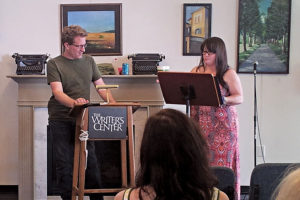
For Audrey Cefaly, there was never a decision to make. She never quite finished her undergraduate degree. And besides, she was already doing the work as a playwright.
“What I realized was that playwriting is something no one can take away from me,” Cefaly said. “They can say that you’re too old to be onstage. You may not get hired as a director. But I think that if you write really well, it doesn’t matter what you look like or where you live.” That’s remained true for Cefaly. Her work has, in her words, “really blown up this year,” with 18 productions of her plays slated for this season, including a National New Play Network rolling world premiere of Alabaster.
In the absence of a degree, Cefaly has developed her own approach to her craft. She said she pictures a play as one point on a map, with seismology equipment placed at various distances from its epicenter. And she’s found her way through this tricky landscape by learning how to digest feedback.
“You might have some grumpy old man at the end of a show giving you feedback,” Cefaly said. “And then a director might be saying something to you like, ‘Something’s not quite right about this moment.’ And somebody else might tell you something and you start to go, ‘Okay, there’s something going on here. I didn’t see it at first, but three people have minted it in different ways.’ So there’s something to that. I’m not saying, make a change with every bit of comment, but take it all in and really look for that kernel of truth. And be really brutal with yourself, you know? Be really honest with yourself.”
Cefaly believes that knowing her voice and why she writes—why she’s so attracted to the aches that drive her characters—is what keeps her writing. “I personally believe that the world is in a lot of pain and we need stories of redemption,” Cefaly said. “I come from therapists and psychologists and teachers. So that comes from me naturally, as an outcrop of my humanity. It’s kind of in my DNA to be that nurturing type, caregiver type. And that’s reflected in my writing.”
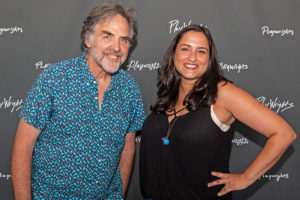
While Cefaly doesn’t see her decision to not pursue an MFA as conscious, Jaclyn Backhaus’s decision was very much intentional.
“I paid so much and I’m still paying so much for my undergrad education,” said Backhaus, who went to NYU for acting. “I was super naïve about the industry, and I was unaware of the financial burden I was getting myself into.” Though she considers the connections she made at NYU “invaluable to me in so many ways,” she said she will often “toggle back and forth about whether I would have changed my decision had I known” about attending an expensive private college.
After she graduated from NYU, she started writing specifically for the voices and strengths of her actor friends. She’d always been a writer—in fact, she wrote her first play while still a senior in high school—but it was the realization that she loved the collaborative nature of building these theatrical worlds that set her on her true path.
“A lot of times it was like, okay, here are the 10 actors who can come to rehearsal today and here’s the baseline exploration,” said Backhaus. “How can we incorporate everyone and give everyone something juicy to work on? Eventually we’d work toward crafting a more full-scale piece. But the intention was always: How can I give gifts to my friends?”
That exploratory mindset soon led to plays like You on the Moors Now and Men on Boats. “I’m projecting here,” Backhaus admitted, “but I feel like I would have been taught a ‘correct’ way to workshop a play” in an MFA program. “And I feel like I would have gone down a road of using facilitation as a way to course-correct people, as opposed to actually listening to work and seeing what’s there and being really excited about it and helping to grow the play down a path that it’s organically already on. I’ve watched a lot of people grow their work through really distinctly unique avenues.”
For Backhaus, the key to a creative life is balance, whether that means finding a job that allows time to write or simply finding a day job you don’t take home with you. But it’s also about community. “Finding a community that you jibe with, that you can bounce ideas off of is so important,” Backhaus said. “A community that celebrates your work and gives you room to celebrate their work forms this sort of reciprocity of demand. It’s demand for creation—for your creation.”
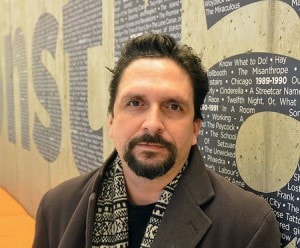
Carlos Murillo now runs the BFA playwriting program at DePaul University, but his road to playwriting wasn’t through school at all. After a year at Syracuse University as an undergraduate, Murillo left to pursue what he calls his “medieval apprenticeship” period.
“I did a series of internships,” Murillo explained, including at Circle Rep and at New York Theatre Workshop, which gave him “a sense of how new work was being created at the time. I kind of attached myself to certain writers and certain theatre companies that were really in the new-works world. That was my education.”
That group of writers, working in the early to mid-1990s, included María Irene Fornés, Eduardo Machado, and Morgan Jenness, among others. Murillo also learned by seeing tons of theatre. “It was very much cobbling together a life from what interested me,” Murillo said.
When Murillo was working as a research assistant, he boldly slipped his first play into a pile of research he’d assembled for a director. “And he read it,” Murillo said. “He called me a day later and had all this wonderful and delightful stuff to say about it. That felt like a very legitimizing moment at the time. Moments like that are really key. Finding the people or the situations that tell you—either overtly or textually—that you’re onto something exciting, something that’s worthwhile.”
That play was Subterraneans, a piece he later self-produced at Todo Con Nada, a downtown New York theatre fixture that closed in 2000. In the time since his “medieval apprenticeship,” Murillo has become a playwright young writers reach out to talk to about process.
“I head the playwriting program at the theatre school at DePaul, so that’s kind of my job,” he said with a laugh. “I can’t separate my writing process from my teaching. The two are very much part of the same practice. I think that’s partly how I was mentored. The people who mentored me, even if they weren’t officially teaching, were great teachers. They believed in me and were able to challenge me to push myself. I was on the receiving end of that generosity, and I feel like you have to pay that forward. So for me teaching is very important.”
These days, Murillo is hungry for theatre that’s unexpected in all the best ways. He likened what he’s looking for to a 20th anniversary dinner he shared with his wife at the Chicago restaurant Alinea. Murillo describes chef Grant Achatz as “a kind of mad scientist who does things with food that are really mind blowing.” The food was surprising, theatrical in presentation, even funny. “It was perception-altering,” Murillo said. “It was an invitation to engage with this food and this material and then be blown away by it. I’d like more of that in theatre. I’m interested in theatre that feels like I’m living through it, as opposed to watching it or digesting the idea of it.”
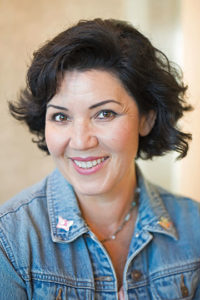
Like Murillo, Diana Burbano found school unappealing. After graduating from high school, she opted to enter an acting conservatory rather than enroll in a university, earning her Equity card at age 19. She started writing plays about 15 years ago, when the acting roles available to her “dried up.” As Burbano explained, “There were no parts, just plain and simple. I started to write with an eye to writing something for myself—and then it snowballed into me really enjoying writing parts for other Latinx women. Because I realized there was a real paucity of roles. And it wasn’t just me who was feeling it.”
A craving for substantial roles for Latinx actors continues to drive Burbano’s writing. Fabulous Monsters, a play about two female punk musicians in their 50s, is one clear example. “I wrote that very specifically to give kick-ass parts to older women,” Burbano said. “They’re not there.”
The process of workshopping and rehearsing new plays as an actor taught Burbano to be less precious with her own text. And while she’s mostly stepped away from performing, she continues to use acting as a training ground for her craft and process as a playwright.
“I’ve always been lucky to work on new work as an actor,” Burbano said. “And I’m always really willing to listen to actors when they say something doesn’t feel right because I get what they mean. That’s how I learned to write, by working on new work.”
And while Burbano considers herself primarily a playwright, she’s been cast in three different productions this season.
“It really feels like things are starting to happen in Latinx theatre,” Burbano said. “For some reason, this year I’ve been working a lot as an actor. Which is hysterical, because I thought for sure that part of my life was quite over.”
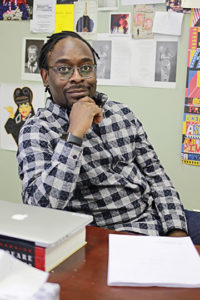
While Murillo and Burbano had little interest in school, James Ijames had a deep desire to continue his education immediately after graduating from Morehouse College with a B.A. in drama. In his case the decision not to pursue an MFA in playwriting was not for lack of trying. During his senior year, Ijames attended the University/Resident Theatre Association auditions and interviews (the URTAs) with the intention of applying for both acting and playwriting MFA programs. When the URTAs cancelled all the playwriting interviews, Ijames went on to earn an MFA in acting from Temple University.
“Then, just to get to Philly, where it’s scrappy and we’re in a basement—it was the perfect storm of artistic DNA just colliding together with the present moment,” Ijames said. “I feel really lucky in that way because it made me not take rejection personally. It made me a lot sturdier when it comes to the ups and downs of this business. I never know what’s next, so let’s take this route and see what happens.”
Philadelphia’s theatre scene ended up being an invaluable training ground, bridging the gap for Ijames between the storytelling modes of his youth—comic books and church theatre—and the more experimental work the city is known for. Through workshops with Pig Iron Theatre, New Paradise Laboratories, and Lightning Rod Special, Ijames learned about devising as a method of new play creation.
“That was new to me,” Ijames said. “There was a stylistic vocabulary in the work that made me wonder if it could be translated onto the page. Can you create exhaustion in a performance, in the writing? Working with those companies was the spark that let me know: Oh. I think I want to be really intentional about this. And I think I have a really specific way that I want to be telling stories as a playwright. Image became much more important than it had been in the past.”
Ijames said he’s a lot more deliberate about his career today than he was even four or five years ago. But it’s that who-knows-what-will-happen energy that’s carried him through. “I got into this place of a lot of people wanting to commission me and I accepted a bunch of them and then realized, ‘Oh my God, I have to write these,’” Ijames said. “So I’m in this place where I actually have to say no to some things sometimes. The actor brain is saying, ‘Don’t ever say no to anything. You don’t know when someone’s going to ask you again.’ I had to unlearn that scarcity thinking. I think as a playwright, and even as a director, you have to think more globally about projects.”

When Aditi Brennan Kapil turned to playwriting after years of acting and directing professionally, it was because her life had shifted in a pretty major way. “I now feel like I fully understand my art form and I have things I want to say,” Kapil said. “That also coincided with the fact that I started having kids, and it got just a lot harder to make my living acting when I was constantly pregnant or nursing. And kids don’t love it when you’re gone in the evenings and acting is very much an evening gig.”
Kapil never considered an MFA in playwriting because it didn’t make sense in the trajectory of her life. But that didn’t make her transition into playwriting any less wrenching. “It was quite traumatic, actually,” Kapil said. “My first play, Love Person, got enough attention that people were like, ‘What else have you got?’ And I was like: ‘Nothing, this is literally my only play.’ So my second play—and at this point I was not totally emotionally certain that I even had a second play in me—got this very fancy new-play development program opportunity. It was this NEA thing with Arena Stage.”
The play, which became Agnes Under the Big Top, included workshops every two months for a year and a half and a research trip to India. “That was probably a little too much,” Kapil confessed. “That second play didn’t make me feel like a playwright. It just made me feel like maybe I really don’t know what I’m doing. It wasn’t until I wrote the Displaced Hindu Gods trilogy, plays based on Hindu gods that I spun off into immigrant bodies in the West, that I really did whatever the hell I wanted and didn’t care what anyone else thought. I was also in control of my writing process.”
Kapil recently moved to Los Angeles to write for “American Gods” on Starz, but she hasn’t abandoned the theatre. “I keep wondering what it is that makes me want to specifically go to the theatre,” Kapil said. “I think it’s that communal experience of: Holy shit, the ground just shifted underneath me, and it was so surprising and so moving and so mind-blowing. Or it just tweaked my brain or pushed me into a space and opened up this new idea, and I’m changed now. That’s the sort of thing that putting people in a room together and taking them on a ride can accomplish.”
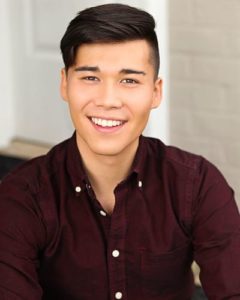
For Sam Hamashima, the decision to not get an MFA in playwriting is a recent one he’s still sorting through. He graduated from the University of Michigan in 2018 with a degree in musical theatre. When he expressed interest in writing plays that could “change the world,” his professor laughed, saying that he’d need an MFA to do that. But Hamashima had no interest in staying in school. “A big part of why I started to write is the community aspect,” Hamashima said. “I want to give more roles to Asian Americans, roles that they can relate to.” As a musical theatre student at Michigan, the only roles Hamashima saw as available to him were in The King and I and Miss Saigon. At the first staged reading for his play Supposed Home at Seattle Public Theatre, Hamashima witnessed the impact of his writing firsthand, as kids and adults alike responded to the play.
“The show is in itself somewhat of an adventure play, you know?” Hamashima said. “We adults are getting the larger allegory and the metaphor and the kids are just like, ‘Oh my God.’ There’s a talking raccoon dog who drinks sake. And there’s a snake who’s shedding his skin to become more American.”
Coming to Seattle for the workshop also showed Hamashima that there’s an audience for his work. Where he’s from—North Carolina—the Asian American community is comparatively small. “It was very emotional to see a community embrace me,” Hamashima said. “And it was really inspiring.”
At one point in Supposed Home, Hamashima uses magical realism to dissect and claim ownership over “Asian glow,” the nickname given to the flush some East Asian people experience when they consume alcohol. When one of his characters drinks sake, she starts to radiate red and orange, sweating as her entire body provides light to a dark cave. “It was so cool seeing kids giggling and parents give knowing glances to each other,” Hamashima said, adding that he wants his Asian American audiences to be in on the joke, not the butt of it.
“For the longest time, I was scared to write,” Hamashima said. “I think in spoken word and I think in metaphor and I think in Japanese anime action sequences. I was like, ‘Is there something wrong with me?’ But no. It’s that you’re different—and if you’re different we should hear that voice.”
That’s good advice for all of us. I didn’t truly embrace that difference until 2015, when I drove from Washington, D.C., to Seattle to start a new chapter of my life. I put down roots in a city covered in grey skies, filled with friends I hadn’t yet met. My “MFA” wasn’t time spent in a classroom. It took the form of a cross-country move, a practice of creating nearly unproducible plays, and an active decision to learn from every opportunity. It was here in Seattle that I began to fill my pages with screaming mermaids, football drills that feel like ballets, and satellites and planets who sing to each other.
I think that’s our duty as playwrights: to listen to our voices and spend each day learning to translate those voices onto the stage.
Danielle Mohlman is a nationally produced feminist playwright based in Seattle. She is an alumni of both the Umbrella Project Writers Group and Arena Stages’ Playwrights Arena cohort. Her play Dust will receive a world premiere in May 2020 at Dacha Theatre in Seattle.


